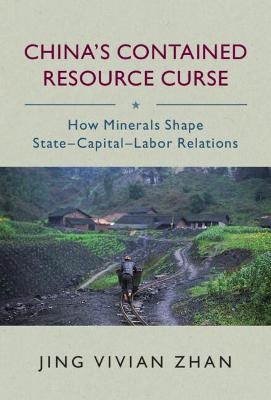
China's Contained Resource Curse
How Minerals Shape State-Capital-Labor Relations
Seiten
2022
Cambridge University Press (Verlag)
978-1-316-51126-8 (ISBN)
Cambridge University Press (Verlag)
978-1-316-51126-8 (ISBN)
This is the first monograph on the socioeconomic and political impacts of minerals on contemporary China, examining the distinctive effects of minerals on the state, capital and labour and their triangular relations. It provides a novel outlook on the resource curse and derives valuable policy implications for resource management.
As a country rich in mineral resources, contemporary China remains surprisingly overlooked in the research about the much debated 'resource curse'. This is the first full-length study to examine the distinctive effects of mineral resources on the state, capital and labour and their interrelations in China. Jing Vivian Zhan draws on a wealth of empirical evidence, both qualitative and quantitative. Taking a subnational approach, she zooms in on local situations and demonstrates how mineral resources affect local governance and economic as well as human development. Characterizing mining industries as pro-capital and anti-labour, this study also highlights the redistributive roles that the state can play to redress the imbalance. It reveals the Chinese state's strategies to contain the resource curse and also pinpoints some pitfalls of the China model, which offer important policy implications for China and other resource-rich countries.
As a country rich in mineral resources, contemporary China remains surprisingly overlooked in the research about the much debated 'resource curse'. This is the first full-length study to examine the distinctive effects of mineral resources on the state, capital and labour and their interrelations in China. Jing Vivian Zhan draws on a wealth of empirical evidence, both qualitative and quantitative. Taking a subnational approach, she zooms in on local situations and demonstrates how mineral resources affect local governance and economic as well as human development. Characterizing mining industries as pro-capital and anti-labour, this study also highlights the redistributive roles that the state can play to redress the imbalance. It reveals the Chinese state's strategies to contain the resource curse and also pinpoints some pitfalls of the China model, which offer important policy implications for China and other resource-rich countries.
Jing Vivian Zhan is Associate Professor in the Department of Government & Public Administration at The Chinese University of Hong Kong. She specializes in comparative political economy, contemporary Chinese politics, intergovernmental relations, local governance and development studies.
1. Minerals and the state-capital-labor triad; 2. Minerals, capital, and local economic development; 3. Resource extraction and victimization of labor; 4. Resources and local state capture; 5. Resources and public goods provision; 6. Coping with the resource curse.
| Erscheinungsdatum | 21.03.2022 |
|---|---|
| Zusatzinfo | Worked examples or Exercises |
| Verlagsort | Cambridge |
| Sprache | englisch |
| Maße | 156 x 235 mm |
| Gewicht | 492 g |
| Themenwelt | Naturwissenschaften ► Biologie ► Ökologie / Naturschutz |
| Sozialwissenschaften ► Politik / Verwaltung ► Staat / Verwaltung | |
| Wirtschaft ► Volkswirtschaftslehre ► Wirtschaftspolitik | |
| ISBN-10 | 1-316-51126-X / 131651126X |
| ISBN-13 | 978-1-316-51126-8 / 9781316511268 |
| Zustand | Neuware |
| Haben Sie eine Frage zum Produkt? |
Mehr entdecken
aus dem Bereich
aus dem Bereich


